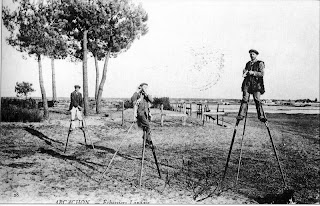
Last Friday, a friend made a joke aimed at me about the French. I suddenly realised, well I have a specificity which makes me recognisable from others. Information systems are great in the fact that people from different countries, cultures, opinions can now share theirs experiences, visions, etc. without any pressure and to anybody in any country in the world. But I have to emit some concerns about the direction these world wide communications are evolving into. It seems that English language, more or less already universally accepted as the business language, is also becoming the language for people to communicate through internet chats or other ways of communication. I understand that it is useful for people speaking different languages to have a 'speaking' agreement so that conversations can take place without the need to buy a CD "learn mandarin in 3 lessons" to reply to the first question of their interlocutor, therefore a conversation can continue without any delay from consulting after each sentence the infamous foreign language CD. But the fact is that it looks like we are moving towards a sole speaking language which could soon lead people to discuss universally same topics and who then would agree on common worldwide interests which could become uniques and big (i.e. a news website would become from general agreement the world best news system and watched by most of the population, as it would be considered the best to watch, therefore leaving few variety discussed from the same topics described by minor networks). I have fears that it would achieve a sort of intellectual eugenism with people more and more lookalike in their way of communicating, having interests and developping and sharing ideas; who will lose their specificity, their uniqueness of thinking which had allowed creativity so far because of the exchange of different ideas driven by experience, culture, etc.
To illustrate this warning towards this culture lobotomisation, I believe it is essential to mark this article with comments in my native tongue as a contribution to the cultural diversity.
Je voudrais décrire mon village natal qui me semble la parfaite illustration de ce besoin de préserver notre identité. Bien que né à Arcachon, j'ai vécu toute ma jeunesse à Biscarrosse et me considère comme Landais pur souche matiné vraisemblement de Basque de part les origines de ma famille. Les Landes dont fait partie Biscarrosse doit son nom à ce que fût son paysage composé essentiellement de landes marécageuses jusqu'à ce que tout d'abord des plantations de pins furent réalisées fin XVIIIe siecle pour repousser la pénétration des dunes vers l'interieur des terres qui ensevelissaient les villages côtiers. Ensuite les plantations furent étendues à l'ensemble du departement en vue d'assainir les marécages pour donner aujourd'hui la célèbre forêt des Landes. Cette lande marécageuse était occupée majoritairement par des bergers montés sur échasses conversant en patois local. Aujourd'hui les échasses font partie du folklore local et des associations essaient de ressusciter le patois ou gascon. Entouré de grand lacs Biscarrosse fût au coeur de l'effervescence aéronautique avec l'avénement de l'hydravion en première moitié du XXe siecle réunissant des pilotes tels que Jean Mermoz ou Antoine de Saint Exupéry. Les loisirs à Biscarrosse se partagent entre tradition du rugby et l'émergence du surf. Toute cet environnement a contribué à constituer mes premiers repères et élaborer ma spécifité.
As a conclusion, it is essential that we find a right balance between a necessary uniformisation to improve the communication of the information and the preservation of our precious cultural identity to create a new breed of worldwide tribes. I believe these tribes would constitue the right fuel blending for the drive of an ingenious system to continue the drive through the journey to our technology evolution.






 As shown above, a chip, light signals are translated by first camera, then implanted chip, into impulses the brain can understand. Whilst at present the quality of image produced is sufficient for a blind person to navigate their way through a building, in the future the technology should give enough clarity for recognition of individual faces.
As shown above, a chip, light signals are translated by first camera, then implanted chip, into impulses the brain can understand. Whilst at present the quality of image produced is sufficient for a blind person to navigate their way through a building, in the future the technology should give enough clarity for recognition of individual faces.
